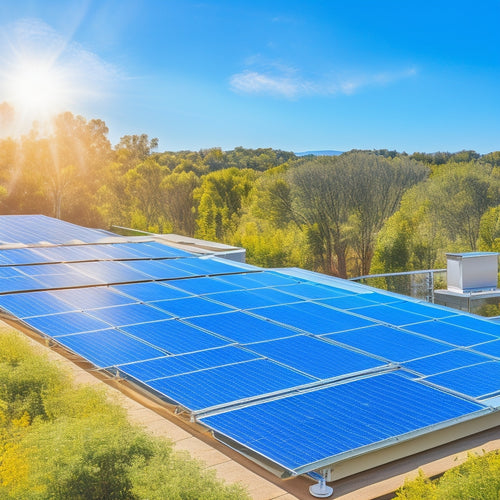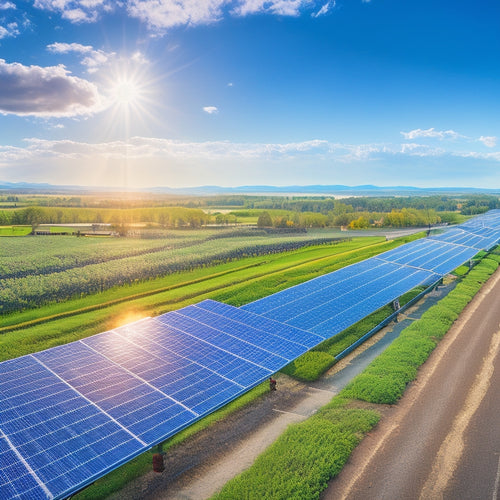
Most Effective Solar Panels
Share
You can maximize your energy output with the most effective solar panels, which boast high-efficiency conversion rates of up to 23%, greatly outperforming traditional models. These top-performing panels optimize energy harvesting through advanced technology and optimized design, resulting in increased power output and reduced waste. Higher energy conversion rates translate to enhanced energy independence and sustainability. Additionally, they come with a range of benefits, including increased property value, efficient temperature coefficient ratings, and wattage per square foot. As you investigate the latest developments in solar panel technology, you'll uncover even more innovative features that can change your energy production.
The Essentials
- High-efficiency solar panels with advanced technology, such as photovoltaic cells, enhance energy conversion rates and maximize power output.
- Panels with low temperature coefficient ratings, such as monocrystalline and thin-film, perform better in high-temperature conditions, reducing energy loss.
- Bifacial technology and high-energy-density panels can boost energy output by up to 25% and reduce installation costs, increasing ROI.
- Sleek and lightweight solar panel designs with high-efficiency materials reduce shipping costs, simplify maintenance, and improve aesthetic appeal.
- Investing in efficient energy harvesting and high-performance solar panels promotes energy sustainability, independence, and increased property value.
Higher Energy Conversion Rate
When it comes to maximizing your solar panel's performance, you're looking for efficient energy harvesting to get the most out of the sun's rays. This means optimizing your panel's design and materials to minimize energy loss and guarantee maximum power output.
By incorporating advanced technology, such as photovoltaic cells, you can greatly enhance energy conversion rates. Additionally, a well-designed Solar Array can address common issues of high upfront costs and complex installation processes.
Efficient Energy Harvesting
Top-tier solar panels boast efficient energy capturing capabilities, which directly translate to a higher energy conversion rate. This means you can generate more power from the same amount of sunlight, making your solar panel system more effective.
Efficient energy capturing is achieved through advanced solar technology, such as multi-junction cells and optimized panel designs. These innovations enable you to utilize more of the sun's energy, reducing waste and increasing overall system performance.
In addition, as concern for the environment and energy efficiency continues to grow, homeowners and businesses are seeking renewable power solutions that can provide a reliable alternative to traditional energy sources.
By investing in efficient energy capturing, you can future-proof your energy needs and reduce your reliance on the grid. You'll enjoy greater energy sustainability with efficient energy capturing.
By maximizing your energy production, you'll reduce your reliance on the grid and lower your carbon footprint. This not only benefits the environment but also provides you with more energy independence.
With efficient energy capturing, you can power your home or business with clean, renewable energy, giving you the freedom to live life on your own terms.
Maximum Power Output
You're looking for solar panels that can deliver maximum power output, and that's exactly what you get with high-efficiency models.
These solar panels boast advanced solar cell technology that enables them to convert a higher percentage of sunlight into usable electricity. As a result, you can generate more power per hour of sunlight, reducing your reliance on the grid and minimizing your environmental impact.
With maximum power output, you can enjoy greater energy independence and a cleaner conscience. By leveraging photovoltaic cell technology, these high-efficiency solar panels can even achieve grid parity, making renewable energy a cost-effective option.
High-efficiency solar panels are designed to optimize energy production, even in low-light conditions. This means you can generate more power during the winter months or on cloudy days, when the sun's rays are weaker.
Increased Property Value Boost
You'll see a significant impact on your property's value when you install the most effective solar panels, which can lead to affordable energy solutions and reduce your reliance on traditional electricity sources.
By utilizing renewable resources, you'll not only increase your property's value but also contribute to a more sustainable future.
With higher selling prices and improved market appeal, your property becomes a more attractive investment for potential buyers.
In fact, studies have shown that solar panels can increase your property's value by up to 17% or more.
Higher Selling Prices
Installing solar panels can greatly enhance your property's selling price, with studies showing that homes with solar panels sell for up to $15,000 more than comparable properties without them.
This increased value is largely due to the long-term savings and environmental benefits that solar panels provide. While the initial installation costs may seem intimidating, they're often offset by government incentives and lower maintenance requirements.
Plus, many customers report high satisfaction with their solar panel systems, which can elevate your property's appeal and resale value. Reputable brands often offer extensive warranty options, giving you added peace of mind.
As technological advancements continue to improve efficiency and reduce costs, the demand for solar panels is likely to increase, driving up market trends and further enhancing your property's value.
Improved Market Appeal
With a solar panel system in place, your property's market appeal receives a significant enhancement, translating to a substantial increase in its resale value. This improvement in market appeal is attributed to the aesthetic appeal of solar panels, which can be designed to blend seamlessly with your property's design. Additionally, consumers are becoming increasingly educated about the benefits of solar energy, recognizing it as an important feature when purchasing a property.
| Feature | Benefit |
|---|---|
| Energy Efficiency | Reduced energy bills and carbon footprint |
| Durability | Long-lasting system with minimal maintenance |
| Aesthetic Appeal | Sleek design that blends with property design |
| Government Incentives | Tax credits and rebates for solar adoption |
| Increased Property Value | Substantial enhancement to resale value |
Efficient Temperature Coefficient Rating
You're probably aware that temperature greatly impacts your solar panel's performance.
High-efficiency solar panels, such as those with Silicon Photovoltaic cells, are designed to minimize energy losses due to heat.
That's why you should look for a low temperature coefficient rating, which indicates heat resistance matters.
Ideally, your solar panel should operate within a range of 59°F to 95°F (15°C to 35°C) for best energy production.
Heat Resistance Matter
How efficiently do solar panels perform under scorching heat? When you're investing in a solar panel system, thermal performance and material durability are vital considerations. High temperatures can considerably impact a solar panel's efficiency, reducing its ability to generate power. Heat resistance matters, and understanding the temperature coefficient rating is key.
| Solar Panel Type | Temperature Coefficient Rating | Material Durability |
|---|---|---|
| Monocrystalline | -0.38%/°C to -0.42%/°C | High-quality silicon, anodized aluminum frame |
| Polycrystalline | -0.40%/°C to -0.45%/°C | Lower-cost silicon, anodized aluminum frame |
| Thin-Film | -0.20%/°C to -0.30%/°C | Flexible, lightweight materials, aluminum or stainless steel frame |
A lower temperature coefficient rating indicates better heat resistance, ensuring your solar panels maintain their efficiency even in extreme temperatures. When choosing a solar panel, look for high-quality materials and a low temperature coefficient rating to maximize your energy output. By considering heat resistance, you can enjoy ideal thermal performance and material durability, securing your investment in solar energy.
Ideal Operating Range
Most solar panels operate efficiently within a specific temperature range, typically between 15°C and 25°C. You should look for panels that maintain their operating efficiency within this range, as it directly impacts their energy production.
Panels with a high temperature coefficient rating can still generate a substantial amount of energy even when the temperature rises above 25°C.
When evaluating solar panels, you'll come across temperature coefficient ratings, usually represented by a minus sign (-) followed by a percentage value (e.g., -0.4%/°C). This rating indicates how much the panel's efficiency decreases for every degree above 25°C. A lower temperature coefficient rating means the panel is more resistant to heat-related efficiency losses.
For instance, if a panel has a temperature coefficient rating of -0.4%/°C and the temperature rises to 30°C, its efficiency will decrease by 2% (5°C above 25°C x -0.4%/°C).
When choosing a solar panel, prioritize those with a low temperature coefficient rating to guarantee peak operating efficiency within the ideal temperature range.
Wattage per Square Foot
You'll want to assess the wattage per square foot of a solar panel, as it directly impacts the system's overall energy output.
High-efficiency panel designs, such as those with sleek black designs that blend seamlessly with roofs, typically boast higher energy density ratings, which enable more power to be generated within a smaller footprint sustainable solar systems.
High-Efficiency Panel Designs
Within the domain of solar panel technology, an essential aspect of high-efficiency panel designs lies in maximizing wattage per square foot.
You'll want to take into account bifacial technology, which can increase energy output by up to 25%. This innovative design allows your panels to capture energy from both the front and back sides, making the most of available sunlight.
When evaluating high-efficiency panels, you should also take into account panel lifespan, solar aesthetics, and installation costs. A longer-lasting panel with a sleek design can enhance your property's value while reducing maintenance costs.
Furthermore, seamless grid integration guarantees a smooth changeover to renewable energy.
Look for manufacturers that offer all-encompassing performance warranties, reliable maintenance practices, and durable modules.
Additionally, take into account the environmental impact of the panels, including recycling processes that minimize waste.
Energy Density Ratings
Enhancing energy density ratings, measured in wattage per square foot, is critical to maximizing the power output of your solar panels. This metric determines how much electricity your system can generate per unit area.
When choosing solar panels, prioritize those with high energy density ratings to minimize the required installation space. This is particularly important for homeowners with limited roof space or those seeking to integrate energy storage solutions.
Higher energy density ratings also impact system compatibility. When selecting an inverter, make sure it's compatible with your panel's wattage output to optimize energy harvesting.
In addition, high-energy-density panels can reduce the overall cost of your solar installation by requiring fewer units to meet your energy needs. This, in turn, decreases the upfront investment and increases your return on investment.
Thinner and Lighter Design
You're likely to notice that the most effective solar panels feature a thinner and lighter design, which yields significant weight reduction benefits.
By shaving off excess material, manufacturers can reduce the overall weight of these panels, making them easier to handle and install.
This weight reduction also translates to lower shipping costs and a decrease in the structural support required for the panels, resulting in additional savings.
Weight Reduction Benefits
The recent advancements in solar panel technology have led to a significant reduction in weight, making them thinner and lighter. You'll appreciate the benefits of this weight reduction, which directly addresses installation challenges, maintenance considerations, and environmental impact.
For instance, lighter panels require less structural support, reducing the overall weight on your roof and minimizing the risk of damage. This design also simplifies maintenance, as you'll need less manpower and equipment to handle the panels. In addition, the reduced weight leads to a lower carbon footprint during transportation, aligning with your eco-friendly goals.
Aesthetic preferences are also catered to, as the sleeker design blends seamlessly into your home's design. Material innovations have made this possible, while keeping cost implications in check.
Durability factors remain uncompromised, ensuring your solar panels withstand the elements and last longer. Regulatory compliance and warranty options are also unaffected by the weight reduction.
Frequently Asked Questions
Can Solar Panels Be Installed on Old or Damaged Roofs?
You'll need a thorough roof inspection before installing solar panels on an old or damaged roof, considering factors like structural integrity, waterproofing, and local building codes to guarantee a safe and efficient installation.
Do Solar Panels Work During Power Outages or at Night?
You won't have power during outages or at night with traditional grid-tied solar systems, but you can achieve grid independence by pairing them with energy storage solutions, like batteries, to store excess energy for later use.
How Long Do Solar Panels Typically Last and Warranty?
You'll be impressed to know that solar panels can last up to 30 years or more! Typically, they come with a 25-year warranty. To enhance their lifecycle assessment, you'll want to follow maintenance tips like cleaning and inspecting them regularly to guarantee peak performance.
Are Solar Panels Resistant to Extreme Weather Conditions?
You'll be relieved to know that solar panels are designed to withstand extreme weather conditions, boasting impressive durability and resilience in the face of harsh environments, ensuring your energy independence remains uninterrupted.
Can I Install Solar Panels Myself or Diy?
As you envision utilizing the sun's energy, you wonder if you can take control on solar panel installation. While possible, DIY solar enthusiasts should be cautious, as improper installation can lead to reduced efficiency, safety risks, and voided warranties.
Final Thoughts
You've narrowed down your search for the most effective solar panels. Now, consider the top performers that excel in key areas. Those with higher energy conversion rates generate more power from the same sunlight. Others enhance your property value with sleek designs. Some excel with efficient temperature coefficient ratings, while others pack more wattage per square foot. And then there are those with thinner, lighter designs for easier installation. Whichever you choose, you'll be utilizing the sun's energy with maximum efficiency.
Related Posts
-

What Types of Solar Energy Devices Are Available
You'll find several types of solar energy devices available today, each customized to different energy needs. Photovo...
-

Top 10 Off Grid Camping Gear Must-Haves
When you're off-grid camping, the right gear is crucial for a smooth expedition. Start with a durable, weather-resist...
-

Applications of Photovoltaic Systems
Photovoltaic systems are versatile, converting sunlight into electricity for various applications. You can use them i...


